Midweek Review
The Teen Mum Question
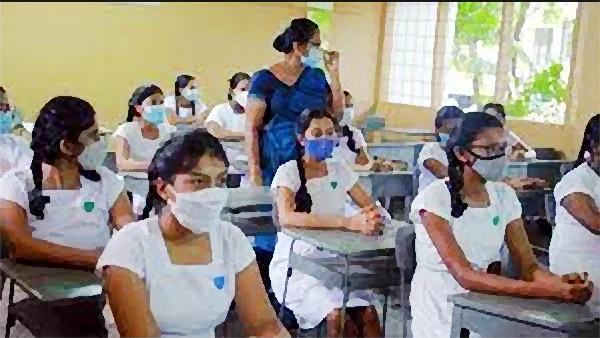
By Lynn Ockersz
Into the shadows of shame,
Is the Teen Mum slinking,
Now that the seed in her womb,
Which she didn’t aim at planting,
Is almost close to ripening,
Rendering her heavy with child,
But judge her not in haste,
And go for the First Stone,
For, she’s a hapless victim,
Of an education needing updating,
With a knowledge of do’s and don’ts,
On the question of human mating,
And going into ‘proud independence’,
May this issue be taken up for discussing.
Midweek Review
Millennium City raid: A far reaching SC judgment
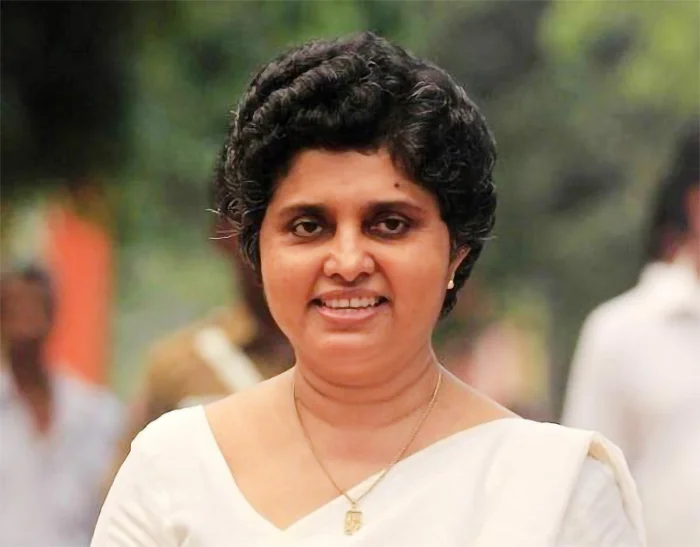
The late IGP Mahinda Balasuriya, who had been the Senior DIG in charge of the Central Province at the time of the ASP Kulasiri Udugampola’s raid on the DMI safehouse at the Athurugiriya Millennium City housing complex, in January 2002, categorised it as an excellent operation. Having commended Udugampola, Balasuriya directed SSP Kandy, Asoka Rathnaweera, to provide the required support to Udugampola. Rathnaweera issued the detention orders in terms of Prevention of Terrorism Act (PTA). Accordingly, six men, including Captain Shaul Hameed Mohammed Nilam (he now lives overseas with his family), and Subashkaran, were detained first at the Kandy Police Station and subsequently at Katugastota. High Court judge Patabendige mentioned this in his ruling, dated March 27, 2025.
Last week The Island examined the circumstances leading to a high profile police raid on a safe-house run by the Directorate of Military Intelligence (DMI) way back in early January 2002.
The article headlined, “Raid on ‘Millennium City DMI safe-house: A forgotten story,” dealt with the controversial but legitimate police action against the DMI in the backdrop of Colombo High Court judge A.K.M. Patabendige issuing an order to exonerate former Assistant Superintendent of Police (ASP) Kulasiri Udugampola accused of leading the raid that undermined national security.
At the time of the Millennium City raid, Udugampola had been the senior officer in charge of the Kandy unit of the Police Kennel Division.
The raiding party included Major Clifford Soysa of the Military Police. Major Soysa’s inclusion in the raiding party should be discussed, taking into consideration magisterial blessings to do so as he accepted police a complaint that the Army didn’t cooperate with an investigation into the killing of 10 Muslims and causing serious injuries to four more at Udathalawinna in the Wattegama police area on Dec, 5, 2001. Therefore, the raid on the DMI safe-house had been mounted, believing Chanuka, one of the then Deputy Defence Minister Anruddha Ratwatte’s sons, was hiding there. The police earlier searched Minister Ratwatte’s residence, Sinha Regiment camp at Yatinuwara road, Mahanuwara, and the Boyagane Army camp, in Kurunegala, looking for Ratwatte’s son.
The Millennium City case in which the State moved court against Kulasiri Udugampola was heard over a period of 20 years.
The acquittal of now frail Udugampola cannot be discussed without taking into consideration a far reaching Supreme Court judgement in respect of a fundamental rights application filed by five military personnel who had been attached to the raided safe house.
The SC bench consisted of then Chief Justice Sarath Nanda Silva, Justice Dr. Shirani Bandaranayake, who wrote the ruling with the other justice P. Edissuriya, also agreeing. Justice Bandaranayake said that due to the actions of Kulasiri Udugampola, and several other personnel under him, those who served the country at the risk of their lives were killed and others faced death threats. Kulasiri Udugampola was represented by Shibly Aziz and Faiz Musthapha.
Having ruled that the fundamental rights of the soldiers had been violated, the SC in January 2004 -two years after the raid – ordered ASP Udugampola to pay Rs. 50,000 each to Mohamed Nilam, P. Ananda Udalagama, H. M. Nissanka Herath, I. Edirisinghe Jayamanne and H. Mohamed Hilmy. The State was ordered to pay Rs. 750,000 to each of them as well. The State and Udugampola paid that amount within three months after the SC order. Each received cheques written in their names to the tune of Rs 800,000.
They received the cheques from the Registrar of the Supreme Court. The full extent of the damage caused by irresponsible action on the part of top UNP leadership as well as those in the Army and police, who callously undermined national security due to political reasons, professional jealousies as well as enmity caused by disciplinary action, has never been fully assessed, even after over two decades.
Arrested Army men and an ex-LTTEer Subahskaran were detained in early January 2002 at Kandy and Katugastota police stations. According to court records, the then Defence Secretary Austin Fernando refused to authorise Udugampola detaining them in terms of the Prevention of Terrorism Act (PTA) for a period of 90 days. However, they had been held under Detention Orders issued by Kandy-based senior law enforcement officers. But, Austin Fernando’s refusal to authorise invoking the PTA compelled Udagampola to hand them over to the Army.
This particular DMI operation involved both regular personnel, particularly Muslim officers, those who had switched their allegiance to the Army and informants.
The January 2 raid led to the arrest of Captain Mohamed Nilam, Staff Sgt. P. Ananda Udulagama, Staff Sergeant I. Edirisinghe Jayamanne, Corporal H.M. Nissanka Herath, Lance Corporal H. Mohamed Hilmy and a suspected LTTE operative, identified as Niyaz/Subashkaran. Others involved in that particular operation had been living in the East and were called into join operations depending on the requirement. On the instructions of Lt. Gen. Balagalle, those tasked with carrying out attacks on selected targets had an opportunity to train under Special Forces instructors from Maduru Oya. They underwent training at the Panaluwa Test Firing Range, where firing special weapons was a key element in the training schedule.
In a bid to ensure secrecy, those operatives mostly operated on their own, and had their own arsenal, which included a range of weapons, including claymore mines. In fact, those involved in the operation functioned on a need-to-know basis. Even senior DMI officials, as well as the Army top brass, except a few, weren’t aware of what was going on. Even the then powerful Deputy Defence Minister, Anuruddha Ratwatte, hadn’t been aware of the Millennium City safe-house, though he knew of the ongoing hits behind enemy lines.
“Those entering LTTE-held territory wore LTTE uniforms to avoid detection in case of coming across terrorists or civilians. We had about 100 uniforms, though the number of those conducting hits in LTTE-held areas was very much lower than the number of uniforms we had,” a person who had been with the DMI, said. “The operation was a new experience. It was to be a sustained assassination campaign, something we had never tried before. Had the politicians allowed it to continue, it could have had a devastating impact on the morale of the LTTE’s fighting cadre. The UNP never realised the dynamics of the DMI action.”
Shortly after the exposure of the DMI operation, Lt. Gen. Balagalle sought a meeting with then Premier Ranil Wickremesinghe to explain the secret operation against the LTTE. The Army chief had been accompanied by officials, including Hendarawithana, while one-time Attorney General Tilak Marapana, National List MP holding the Defence portfolio, and Minister Milinda Moragoda, too, were present.
“Except for Minister Moragoda, the others obviously didn’t realise what we were doing. They acted as if we were conspiring to do away with the political leadership so as to undermine the Norwegian initiative,” he said “We quickly realised we were up against a government, which simply wanted to negotiate a deal with the LTTE at any cost. The LTTE and the Norwegians exploited the situation to the hilt.”
A section of the media, too, campaigned against the Army, particularly the DMI chief Hendarawithana, who played a pivotal role in the intelligence set-up. He remained high on the LTTE hit list for over a decade. The LTTE went to the extent of exploring the possibility of having him assassinated in Colombo, with the help of an Army officer, who allegedly conspired with terrorists to kill Lt. Col. T. N. Muthalif in May 2005. The DMI head was constantly portrayed as a threat to the peace process and an obstacle to the UNP’s efforts to reach an understanding with the LTTE, regardless of the consequences.
In the run-up to the raid on the DMI safe house, an officer attached to the organisation had aroused suspicions due to his attempt to obtain the address of the safe house. He had casually made inquiries from those who were believed to be involved in the operation. Although not being successful, initially, the detractor had finally managed to secure the required information.
Having won the parliamentary election in Dec. 2001, the UNP unceremoniously terminated operations inside enemy lines, which could have helped the government debilitate the LTTE. The DMI never conducted operations involving ex-LTTE cadres again, though Lt. Gen. Balagalle got the DMI to launch an operation which enabled the Special Forces to carry out some devastating attacks on the enemy.
It would be pertinent to examine an operation launched in July 2001 by the DMI until its conclusion in December, 2001. In spite of the failure of the first and second operations in Batticaloa South to eliminate the intended targets, subsequent strikes sent shockwaves through the LTTE.
The first targeted assassination attempt was directed at an LTTE cadre, identified as Jim Kelly, on July 18, 2001, followed by a foray on September 12, 2001. The second operation targeted a military wing cadre, identified as Jeevan. On September 17, operatives carried out a successful attack on ‘Major’ Mano Master, who was at that time in charge of the communications network in the area.
The LTTE curbed movements of its senior cadres as it struggled to thwart infiltrators causing havoc in areas under its control. Despite a major surveillance operation, undercover operatives successfully ambushed Karikalan’s vehicle on October 18, 2001. The destruction of the vehicle fuelled speculation of Karikalan’s demise, with a section of the media reporting him killed in a special operation. Shortly after the attack on Karikalan’s vehicle, the Army intercepted a radio conversation between Karikalan and his wife, a medical doctor by profession, serving in the Northern Province. “She simply begged him to leave Batticaloa and take refuge in the North to avoid the Army’s deep penetration operations.
“We scored a significant success on Prabhakaran’s birthday on Nov. 26, 2001. Troops finished off ‘Major’ Swarnaseelan and ‘Captain’ Devadas in the Pulipanjikkal area. It was the last operation before the Dec. 5 General Election. In fact, we weren’t too concerned about the political factor,” the official said.
Unknown to the Army, the Norwegians, the LTTE and the government had been engaged in serious negotiations, with the Norwegians eyeing a comprehensive agreement. Due to unprecedented success in their strategy, the LTTE pushed for a specific clause, prohibiting forays by Deep Penetration Units.
Amidst a furore over the UNP allegations that the Army was conspiring to assassinate Wickremesinghe, operatives blew up a truck killing five LTTE cadres on Dec. 11, 2001. Then again, they destroyed an LTTE bunker, at the entrance to a base used by Karuna, in the Kokkadicholai area, on Dec. 21, 2001.
Some of those officers involved in special operations and ex-LTTE cadres had mutual trust and friendship. One of the ex-LTTE men, holding the rank of a ‘Major’ killed in an LTTE attack at Kalubowila, sometime after the exposure of the Millennium City safe house, had played a pivotal role in the DMI operations.
Having failed to persuade the ‘Major,’ known as Suresh, to poison one of the intelligence officers spearheading covert operations in the East, the LTTE sent a hit squad to finish him off. “In spite of being outnumbered, Suresh fought back courageously. When Suresh refused to open the door to admit strangers, whom he swiftly identified as assassins sent from the East, one of the armed men shot at the door lock. Reacting to the threat, Suresh had thrown a hand grenade at the raiders, though one of them swiftly picked it up and flung it away. The hit squad fled the scene after taking the target. During a routine search, we found a diary maintained by Suresh. According to his diary, Suresh’s wife had been in touch with the LTTE for some time. On the instructions of the LTTE, she had asked him to invite the officer, whom the LTTE considered as a major threat, to their Kalubowila home, where she planned to offer him poisoned cake. Suresh had met the intended target and made an attempt to brief him on the LTTE plan. Unfortunately, the officer had reacted angrily when Suresh sought a private meeting to discuss the issue. According to the diary, Suresh had left without revealing his secret.”
Suresh wrote in his diary that he didn’t want to carry out the LTTE order as the Army looked after him and his family well. Even after his killing, the Army continued to look after his children for some time, though they were subsequently handed over to their mother.
Despite the setback suffered due to the Millennium City raid, the Army gradually redeveloped its capability in conducting operations behind enemy lines, with significant success during General Sarath Fonseka’s tenure as the Commander of the Army. With the expansion of security forces’ frontlines as troops advanced on several fronts against the LTTE held Vanni region, those conducting operations behind enemy lines had a wider area to operate and relatively easy access and exit after a major hit as the enemy no longer had any respite to plan counter measures.
Perhaps the most important target that had been taken out on information received by the DMI before the UNP put an end to such operations was Vaithilingam Sornalingam alias Col. Shankar Sornalingam, a close confidant of LTTE leader Velupillai Prabhakaran. Special Forces targeted Shankar’s vehicle with a claymore mine on the Puthukkudiyiruppu – Oddusuddan road on the morning of Sept. 26, 2001. Nothing could have shaken the top LTTE leadership more than Shankar’s killing by Special Forces. That particular operation stunned the LTTE as it had come to consider itself as invincible, helped by supporting propaganda, especially from the West, and by willing so called defence experts at a stage of the conflict where the then government clearly, out of fear or lacking any feelings for the country, was literally suing for peace on its knees and busy negotiating with the LTTE through the Norwegians. This was clearly revealed by the one-sided ceasefire agreement, advantageous to the Tigers drawn up by the Norwegians and signed blindly by then Premier Wickremesinghe even without the knowledge of the then Commander in Chief President Chandrika Kumaratunga and much of his government. Not that she was more suited for the job as she being more or less like a proverbial busybody with no sense of time and only good for idle chatter most of the time. The intelligence needed for the hit on Shankar had been provided by an informant working for the DMI, who, in fact, accompanied the patrol tasked with the operation, though not being present at the time the target was taken, those who were involved with clandestine operations said.
During Eelam War IV (2006-2009), the Army expanded operations behind enemy lines. Special Forces veteran Major J.A.L Jayasinghe, who had spearheaded the attack on Shankar, was killed in what a colleague described as a suicide mission on the Vanni east front on Nov 26, 2008 in the Oddusuddan area. At the time of the death, Jayasinghe was attached to the 3rd Special Forces Regiment, which specialised in action deep inside the LTTE-held area. Twice honoured with Weera Wickrama Vibushana (WWV), Jayasinghe was promoted to the rank of Lieutenant Colonel, posthumously.
Since its inception, the DMI has steadily grown into a large organisation that played a critical role over the years. At the time the combined security forces brought the war to an end, the DMI had six units deployed.
The country’s premier wartime intelligence setup DMI suffered irreparable damage as a result of the January 2002 raid. Of the five men who received compensation in 2004, retired Sgt. Major Jayamanne committed suicide in Oct. 2016 at his Kegalle residence by hanging himself. He left a note accepting responsibility for the assassination of The Sunday Leader Editor Lasantha Wickrematunga in January 2009. P. Ananda Udalagama has been investigated for the abduction of Wickrematunga’s driver and the attack on one-time Divaina Editor Upali Tennakoon.
(Concluded)
By Shamindra Ferdinando
Midweek Review
Inequality is killing the Middle Class

Diary of a CitiBank Trader:
“I would like to have kids one day… and I’ll have to tell them, I made my money betting on the collapse of society, that’s the truth…”
–– Gary Stevenson
Gary Stevenson is a highly successful financial trader formerly employed at Citibank, in London’s historic central business district (CBD), colloquially called “The City”. A talented mathematics student, he earned a full-scholarship to the London School of Economics (LSE) and recalls noticing immediately that there were not many students at LSE with his background: “poor, working class” and even fewer at Citibank, where Stevenson earned an internship by winning a national mathematics contest. The 38-year old carries a strong East London accent that he admits made him stand-out quite a bit. Early on during his time at Citibank, somebody asked him “where’s that accent from, I love it”, he had to tell them that he was from East London, where they were standing, in Canary Wharf.
Speaking on a UK television interview show from February 2025, Stevenson says: “My YouTube channel, we got 1.2 million views yesterday in one day, ONE DAY… there’s a reason why I used to get paid 2 million pound-a-year to do this, because I’m [very] good at this okay, I shouldn’t be on YouTube, I shouldn’t be here, it doesn’t make no sense, I should be working for a hedge fund making 5 million pound-a-year… I’m here talking to you, talking to your audience because I can see… that the middle class, ordinary people, are going to be driven into desperate poverty…”
At Citibank in 2008, Stevenson earned a basic salary of GBP 36,000 but his first full-year bonus was GBP 400,000; he had amassed more money in 18 months than his father had in his entire lifetime. “Listen … these guys that tell you economics on the news, they get paid one hundred, two hundred grand a year, I got paid millions of pounds a year to do it because I’m the best at it and I still beat them, every year…The best economists in the world are all traders… the best-paid ten thousand economists in the world are all traders …”
By some estimates the Bank of England, the UK’s Central Bank, has injected around One Trillion Pounds (over GBP 1,000,000,000,000) into the UK economy since the 2008 financial crisis, during which period, living standards in the UK have been steadily deteriorating as a stagnant middle class struggles amidst a cost of living crisis.
The Uk are not alone, Governments and Central Banks around the world have injected hundreds of billions of dollars into their economies in the past two decades in response to extreme economic and social crises; eg: 2008’s financial crisis and the Covid19 global pandemic. The broad instruments were (1) quantitative easing (QE) – Central Banks purchasing financial assets such as government bonds and (2) direct fiscal ‘stimulus’ payments to business sectors and even individuals, usually funded by the Treasury.
In early 2011, Stevenson got called into a meeting with one of the Citibank’s top economists who went through the financial situations of a lot of the world’s major governments “so Italy, Spain, Portugal, Greece, Ireland but also the UK, US, Japan and what he said was basically, all of these governments are effectively bankrupt, they spend more than their income every year and they’re going further and further into debt… they’re being forced to sell their assets ….”
Where did all that Money go?
In response to the Covid19 pandemic of 2020, the UK Government engaged in QE using a 2009 program called the ‘Asset Purchase Facility’ (APF) and a fiscal stimulus called the Coronavirus Job Retention Scheme (CJRS) popularly known as the Furlough Scheme. The CJRS subsidised employee wages (up to 80% capped at GBP 2,500 per month), totalling GBP 70 bn from March 2020 to September 2021. The APF totalled GBP 450 Bn of UK Govt Bonds (and a small amount of UK Corporate Bonds) from 2020 onwards; the total portfolio peaked at GBP 895 Bn in late 2020 and was around GBP 680 Bn by end 2024.
Stevenson’s analysis suggests that QE has led to funds flowing into financial markets, inflating asset prices, be they stocks, bonds or property, thus disproportionately benefiting the owners of these asset classes – mostly the wealthy and ultra-wealthy.
Having graduated to a permanent position on the Trading Floor of Citibank in 2007, Stevenson’s job was to analyse and trade on interest rates. In the aftermath of the collapse of Lehmann Brothers, the US Federal Reserve slashed interest rates from 5% to 1% by October 2008 and before the end of the year rates were cut to a target range of 0.00% to 0.25%. In the UK, a similarly dramatic collapse of interest rates: 5% in October 2008 down to 2% in December 2008. Stevenson recollects that “suddenly, we’re all betting on when will the economy recover… bringing rates to zero is like an emergency measure… and the economic theory tells you this should cause a massive economic recovery and we obviously know now, it didn’t happen but at the time, every single year, the economists, the traders, the markets said: ‘next year rates will go up, which means next year the economy will recover’, literally every year 2009, 2010, 2011 all the way until 2020 and it wasn’t until Covid when they finally said, ‘okay rates will stay zero forever’ and then of course, rates immediately went to 5% ….”
This sequence of events suggested to Stevenson that, other than the elite Trading Desks of the world’s largest banks and hedge funds, most economists and market participants were not very good at predicting what would happen in their economies. “The way I became a millionaire is, after the financial crisis, I realised that because of a massive growth in inequality, we would basically never come out of that crisis and I started to put massive bets… that the economy would get worse and worse… and within a year of doing that, I became Citibank’s most profitable trader in the world ….”
The ‘Living Standards Outlook’ for 2023 by UK-based think-tank, Resolution Foundation, stated that “Absolute poverty is set to rise in the short-run, from 17.2 per cent in 2021-22 to 18.3 per cent in 2023-24 (or an additional 800,000 people in poverty). Child poverty in 2027-28 is forecast to be the highest since 1998-99, with 170,000 more children in poverty than in 2021-22”. The Joseph Rowntree Foundation states that “More than 1 in 5 people in the UK (21%) were in poverty in 2022/23 – 14.3 million people. Of these, 8.1 million were working-age adults, 4.3 million were children and 1.9 million were pensioners. A 2024 report by the Office for National Statistics (ONS) highlights that Real Household Disposable Income (RHDI) per person had grown at the slowest pace for the poorest 50% of the population and income inequality is widening, those in the lower 20% of the income distribution have seen stagnant or even falling real incomes over the last two decades.
A 2018 Bank Of England report titled, ‘The Distributional Impact of Monetary Policy Easing in the UK 2008 – 2014’, (Bunn et al) states that while in percentage terms, the gains were evenly spread, there were still major distributional issues such as wealthier households gaining more because they held more assets that appreciated due to QE: “the overall effect of monetary policy on standard relative measures of income and wealth inequality has been small.
Given the pre-existing disparities in income and wealth, we estimate that the impact on each household varied substantially across the income and wealth distributions in cash terms ….”
From Progress to Poverty
In 2014, ThinkTank, Centre for American Progress (CAP) released a report titled ‘The Middle-Class Squeeze’ submits that American “middle-class share of national income has fallen, middle-class wages are stagnant, and the middle class in the United States is no longer the world’s wealthiest… The cost of being in the middle class—and of maintaining a middle-class standard of living—is rising fast too ….”
In his 2019 book, ‘Third Pillar’, former Governor of the Reserve Bank of India, Raghuram Rajan discusses the impact of the middle-class squeeze on communities: “The anxieties of the moderately educated middle-aged white male in the United States are mirrored in other rich developed countries in the West… moderately educated workers are rapidly losing, or are at risk of losing, good ‘middle-class’ employment, and this has grievous effects on them, their families, and the communities they live in… as public anxiety turns to anger, radical politicians see more value in attacking imports and immigrants. They propose to protect manufacturing jobs by overturning the liberal rules-based postwar economic order, the system that has facilitated the flow of goods, capital, and people across borders”.
Stevenson notes that “we increased inequality at the fastest rate in the history of this country during a time when the economy was closed. Only luxury and non-essential spending reduced during covid; they gave money to furloughed workers, who… then had to spend most of it immediately to pay bills”. Furlough was not a gift but a replacement of a portion of wages of working people who transferred that to: landlords through rent, shareholders of Banks through mortgage payments and shareholders of energy companies through higher bills. Stevenson says the wealthiest in society earn massive amounts of passive income from the assets they own; monthly incomes so large it is impossible to spend it all on consumer goods so instead it leads them to hoard wealth by buying assets.
This correlates to rising house prices, which Stevenson analyses as occurring in a context where almost all other asset classes have seen broad and significant appreciation over the last 20 years: major stock indexes such as S&P 500, FTSE 100 and FAANG (tech stocks), Real Estate, Bonds (until the 2022 crash), Gold etc. Stevenson’s basic claim is that the ultra-rich are buying up all the assets with the excess liquidity and driving up the prices of those assets. “If you have the wealth of the rich going up 5% and an economy that’s growing at 1 or 2%, there is nothing they can do, they outgrow the economy. The rich are squeezing the middle class out.”
A Betting Man
Sri Lanka’s own growing wealth and income disparities are well-established. A December 2022 report by the Department of Census and Statistics (Dharmadasa et al) notes that “the highest 10 percent of the population shared 32 percent of total income in 2016 while the lowest 10 percent of the population shared 3 percent in the same year”. The World Inequality Lab states that the “top 10% of Sri Lankans… own 64% of all personal wealth; the top 1% have 15% of all income and 31% of all wealth. The bottom 50% of Sri Lankans have just 17% of all income and only 4% of all personal wealth”.
A report by the Centre for Poverty Analysis (CEPA) from January 2021 prior to the economic crisis and the worst impacts of the pandemic, states that, “more than half the total household income of the country is enjoyed by the richest 20%… while the bottom decile (poorest 20%) gets only 5%, with share of household income being just 1.6% for the poorest 10%.”
Dr. Vagisha Gunasekera, an Economist attached to the United Nations Development Program (UNDP), was quoted in a poverty report from 2023: “The top one percent of Sri Lankans own 31 percent of the total personal wealth, while the bottom 50 percent only own less than 4 percent of the overall wealth in the country. This provides us with a snapshot of how unequal our country is”. The UNDP report called Sri Lanka one of the most unequal societies in the South-East Asian region.
Gary Stevenson is part of a group of UK-based high net-worth individuals called Patriotic Millionaires who are campaigning for a minimum 1% wealth tax on wealth over ten million pounds: “if you were worth 12 million pounds you pay 1% on 2 million pounds, which is 20,000 a year”. This would only impact a very small portion of tax payers and would raise between 10 and 20 billion pounds annually; in a context where the new Labour Government under Prime Minister Starmer has announced plans to cut more than five billion pounds from its welfare budget by 2029/30.
Sri Lanka, almost 3 years after a once-in-a-generation economic collapse and an IMF-backed revenue-based fiscal consolidation program, has barely been able to improve its income tax to GDP, depending instead on VAT and other indirect taxes as well as excise duty on alcohol and cigarettes. Corporate Tax to GDP on average was 1.5% for ten years before increasing to 2% in 2024, woefully below what more successful countries in our development peer-group tend to generate. While the government lost some Rs. 950 Bn in tax revenues from corporates in the last 21 months due to incentives, the working people of Sri Lanka continued to carry the burden of government revenue growth through VAT. Health, education systems are crumbling, more than 50% of households receive cash stipends from the government while demand for luxury vehicles remains, with depreciating assets like luxury SUVs priced at the same level as a luxury condominium unit in central Colombo. The prevalence of these dynamics and what it says about the internal economic distribution systems point to unsustainable economic arrangements and asset bubbles amidst rising income and wealth inequalities.
Stevenson notes that “My dad lived in an era of house price two-times income, I live in house-price 20-times income, my kids will live in 40-times income…” The point is simple: inequality is driving a historic concentration of wealth at the top of income and wealth structures. “Nobody likes paying tax, but the fact of the matter is, the wealth of the middle class and the wealth of the government is being drained by this super-rich group, how do we get it back? Rishi Sunak is worth 700 million pounds, that means he has a passive income every year of 30 million pounds… they use their passive income to buy more assets… tax is the only way that you, a regular working person, can protect yourself from the superrich”.
What makes Stevenson a fascinating and effective messenger is that he is still trading, making bets on the economy: “I don’t get paid to have opinions… I was one of the best paid and most successful traders in the world at one of the biggest banks in the world, I place bets and l’ve been betting for 14 years that the working class in my country and the working class in your country will collapse into desperate worsening poverty year after year and, I’m a multi-millionaire from doing that… I don’t just say this, I don’t just come on here and give my opinions, I’m betting on everything I’ve told you today….”
The writer has 15 years of experience in the Financial and Corporate sectors after completing a Degree in Accounting and Finance at the University of Kent (UK). He also holds a Masters in International Relations from the University of Colombo.
He is a media presenter, political commentator and Foreign Affairs analyst, invited regularly on television broadcasts as a resource-person.
He is also a member of the Working Committee of the Samagi Jana Balawegaya (SJB).
By Kusum Wijetilleke
kusumw@gmail.com
Twitter: @kusumw
Midweek Review
Of Books and Bread
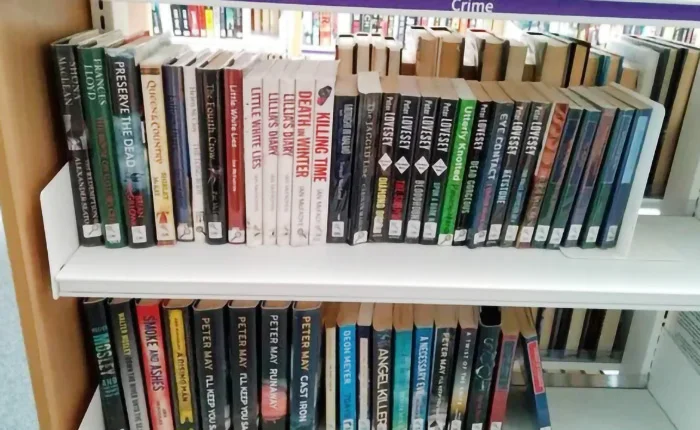
By Lynn Ockersz
A learned judge across the Palk Strait,
Had certainly got his basics in place,
When he held for the primacy of Bread,
And received wisdom freshly upheld,
That it is to the eatery and not the library,
That a starving human drags himself,
Thus putting to rest at first blush,
The Bread or Books first debate,
But rush not to conclusions in this instance,
For, while Bread satisfies the physical self,
It’s Books that nourish the heart and mind,
So, let not Books and Bread futilely contend.
-

 News5 days ago
News5 days agoSuspect injured in police shooting hospitalised
-

 Features6 days ago
Features6 days agoRobbers and Wreckers
-

 Business5 days ago
Business5 days agoSanjiv Hulugalle appointed CEO and General Manager of Cinnamon Life at City of Dreams Sri Lanka
-

 Business6 days ago
Business6 days agoBhathiya Bulumulla – The Man I Knew
-

 Business7 days ago
Business7 days agoNational Anti-Corruption Action Plan launched with focus on economic recovery
-

 Features4 days ago
Features4 days agoLiberation Day tariffs chaos could cause permanent damage to US economy, amid global tensions
-
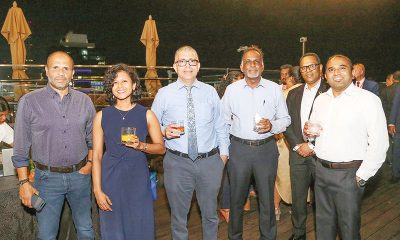
 Business4 days ago
Business4 days agoMembers’ Night of the Sri Lanka – Russia Business Council of The Ceylon Chamber of Commerce
-
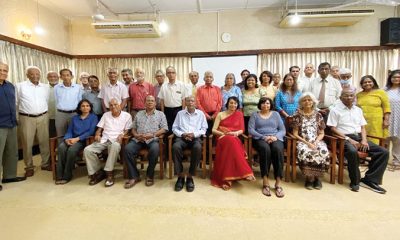
 Features4 days ago
Features4 days agoMinds and Memories picturing 65 years of Sri Lankan Politics and Society











